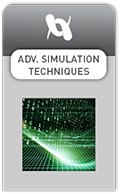Attend a comprehensive series of courses to gain knowledge and experience in the full photonic design workflow from devices to systems.
Courses can be taken individually or together as a package.
In the full program, you will learn to design waveguides and fibers, automate
the design of photonic integrated circuits, design fiber-based devices such as doped-fiber amplifiers, and ultimately simulate high-speed
optical transmission systems
Our team of domain experts will guide you through the various levels of abstraction using VPIphotonics integrated and interoperable software tools giving attendees access to the software in a cloud-based environment.
Each day includes software access and an 8-hour virtual session of lectures, guided labs, and independent work with 1-on-1 support.
Registration is limited to provide attendees direct access to our team of experts, so reserve your seat today!
22nd March 2022 – Device Designer (1 day)

Analyze and optimize integrated photonic devices, waveguides, and optical fibers based on 2D cross-section and 3D device layouts made of real optical materials using VPIdeviceDesigner.
Within a single day, you will learn how to simulate your 2D cross-section, including optical material definitions, nonuniform meshing, mode profile calculation, as well as visualization and extraction of crucial parameters. Additionally, you will have the possibility to expand your cross-section into the 3D-shaped layout and perform a BPM simulation (Beam Propagation Method) to visualize the mode propagation within the implemented device.
Design topics include:
23rd - 24th March 2022 – Photonic Components (2 days)

Get acquainted with efficient simulation techniques for circuit-level simulations by working with VPIcomponentMaker Photonic Circuits and various VPItoolkit PDKs to design and evaluate the performance of your circuit starting from basic components and expanding to complex active and passive PICs for various applications.
During the training, you will learn how to integrate and automate modeling, optimization, and layout extraction of single building blocks and complex hierarchical circuits. Live demonstrations of the recently released Infinera, SMART Photonics, Fraunhofer-HHI, LioniX, and Ligentec process design kits (PDKs) supporting Synopsys OptoDesigner, Luceda IPKISS, Nazca Design, and Siemens EDA's S-Edit and L-Edit Photonics tools will be held by our team of simulation experts.
Design topics include:
25th March 2022 – Fiber Optics (1 day)

Gain experience in using VPIcomponentMaker Fiber Optics for modeling and optimization of fiber-based optical devices such as various optical signal amplifiers.
The training is dedicated to the amplification of optical signals. In the course, you will learn the basics of software applications such as the optimization of pump configurations and the characterization of designed amplifiers. One of the covered topics is doped fiber amplifiers, in particular, Erbium and Thulium doped fiber amplifiers (EDFA and TDFA) for signal amplification in C-band and S-band.
The design and applications of Raman amplifiers are also considered, including the optimization of pump wavelength and power for a given gain shape.
Design topics include:
29th - 30th March 2022 – Optical Systems (2 days)

Intended for both beginner and experienced users of VPItransmissionMaker Optical Systems, this hands-on course will focus on the design of high-speed optical transmission systems.
This course will cover the fundamentals of the software and will build to more advanced topics, tailored to those interested in the modeling and investigation of technologies
for short-reach optical links, as well as digital coherent transmission systems suitable for metro and long-haul applications. Transmitter- and Receiver-side digital signal processing (DSP) techniques for both
direct- and coherent-detection systems will also be covered.
Design topics include:
31st March 2022 – Advanced Simulation Techniques (1 day)

Enhance your simulations with advanced automation techniques and use our API for developing your own module library or for controlling the VPI PDE.
This one-day training shows you how to create modules using third-party scripting languages such as Python or MATLAB, and how to control the VPI simulation engine from outside the VPIphotonics Design Suite.
In addition, you will learn advanced automation techniques using simulation scripts and macros. There is also the opportunity to work on your own design with the support of an application engineer.
Design topics include:
Each day includes software access and an 8-hour virtual session of lectures, guided labs, and independent work with 1-on-1 support.
Registration is limited to provide attendees direct access to our team of experts, so reserve your seat today!